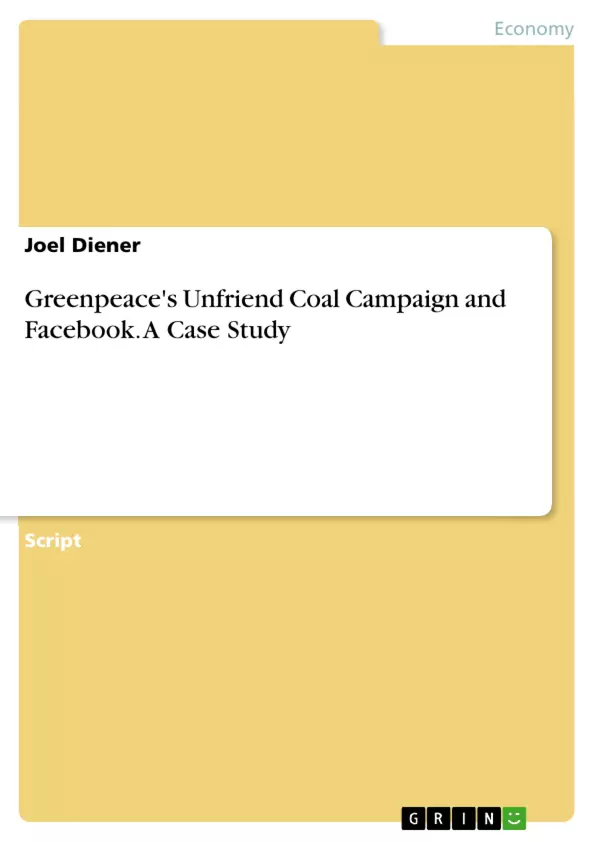Once Facebook announced its plan to build a facility in Prineville, it was confronted with critics from the society lead by Greenpeace through their official Facebook profile and Youtube video.
Greenpeace objected the decision of Facebook to work with an energy supplier (PacifiCorp) who produces the energy mostly from coal. Greenpeace stated that Facebook should set a positive example for the industry and is financial secured to influence the mixture of their energy supply.
So now is the question which strategies are possible for Facebook to realize the plan for the facility which will support the economical weak community without endangering their reputation?
Inhaltsverzeichnis (Table of Contents)
- Executive summary
- I. Statement of the problem
- II. Causes of the problem
- III. Recommended solution, decision criteria and alternative solutions
- IV. Implementation and justification
- V. Conclusion
- VI. External Sourcing
Zielsetzung und Themenschwerpunkte (Objectives and Key Themes)
This case study examines the ethical dilemma faced by Facebook when confronted with Greenpeace's "Unfriend Coal" campaign. It explores the potential consequences of Facebook's decision to build a data center in Prineville, Oregon, powered by coal-generated energy. The study analyzes the various options available to Facebook, considering the social and environmental implications of each choice.
- Corporate Social Responsibility (CSR)
- Environmental Sustainability
- Ethical Decision-Making
- Public Perception and Reputation Management
- The Role of Social Media in Activism
Zusammenfassung der Kapitel (Chapter Summaries)
- Executive Summary: This section provides a brief overview of the case study, highlighting the conflict between Facebook's expansion plans and Greenpeace's concerns regarding the use of coal-generated energy. It introduces the key stakeholders involved and the potential strategies Facebook could adopt.
- I. Statement of the problem: This chapter delves into the specific issue at hand, outlining the controversy surrounding Facebook's new data center in Prineville. It emphasizes the company's commitment to energy efficiency while acknowledging the public criticism from Greenpeace regarding the use of coal-powered energy.
- II. Causes of the problem: This chapter explores the background of the conflict, examining the motivations and actions of both Facebook and Greenpeace. It sheds light on the contrasting objectives of the two entities and the factors contributing to the public pressure surrounding the issue.
- III. Recommended solution, decision criteria and alternative solutions: This chapter analyzes a range of potential solutions for Facebook, considering the advantages and disadvantages of each option. It outlines the decision criteria that should guide Facebook's response to the Greenpeace campaign, including considerations for reputation management, environmental impact, and financial implications.
- IV. Implementation and justification: This chapter delves into the practical aspects of implementing the chosen solution, providing justifications for the selected approach. It considers the challenges and opportunities associated with each option, emphasizing the need for careful planning and execution.
Schlüsselwörter (Keywords)
This case study centers on the intersection of corporate social responsibility, environmental sustainability, and public perception. Key themes include ethical decision-making, the role of social media in activism, and the impact of public pressure on business practices. The case study examines the specific example of Facebook's data center in Prineville, Oregon, highlighting the challenges of balancing economic growth with environmental concerns.
Frequently Asked Questions
What was the goal of Greenpeace's "Unfriend Coal" campaign?
The campaign aimed to pressure Facebook into using renewable energy sources for its data centers instead of relying on coal-generated electricity.
Why did Facebook choose Prineville for its data center?
Facebook intended to support an economically weak community while expanding its infrastructure, but faced backlash due to the local energy supplier's use of coal.
How does social media play a role in environmental activism?
Greenpeace used Facebook's own platform and YouTube to mobilize public opinion, showing how social media can be a powerful tool for holding corporations accountable.
What are the decision criteria for Facebook in this ethical dilemma?
The criteria include reputation management, environmental impact, financial feasibility, and Corporate Social Responsibility (CSR) commitments.
What is the recommended solution for Facebook's energy problem?
The study analyzes various options, such as influencing the energy mix of suppliers or investing directly in renewable energy to protect its reputation.
- Quote paper
- Joel Diener (Author), 2014, Greenpeace's Unfriend Coal Campaign and Facebook. A Case Study, Munich, GRIN Verlag, https://www.hausarbeiten.de/document/304607


